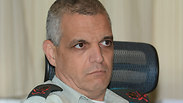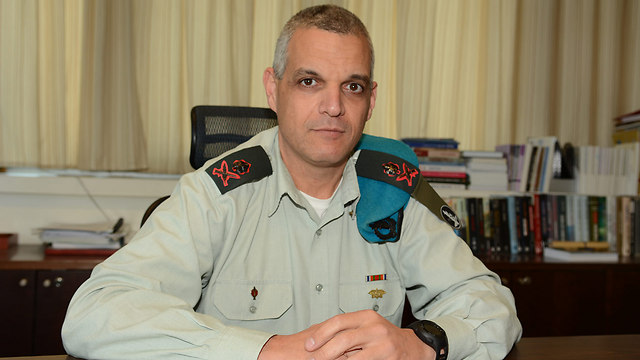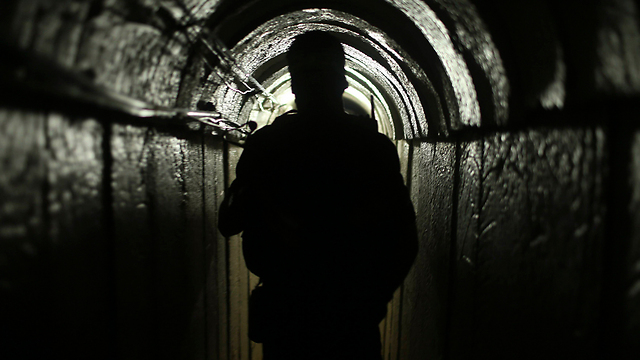

IDF Operations Directorate chief: No strictly-military solution for Gaza problem
Maj.-Gen. Yoav Har Even says the army could have been more prepared to deal with tunnel threat, but that 'Hannibal Directive' used on Rafah's Black Friday during last summer's war was never meant to endanger Hadar Goldin's life.
After almost a decade of operations in the Gaza Strip since the 2005 Israeli disengagement, the IDF's outgoing Operations Directorate chief, Maj.-Gen. Yoav Har Even, says there is no ultimate solution to the "Gaza problem."
"As a rule, there are no military solutions to political problems. These are always combined solutions. Using military force is only a part of the policy," Har Even says in an interview with Ynet.
"It has to do with things happening outside the army: A general examination of the Palestinian arena, the ties between Gaza and the West Bank, and the tensions within the Palestinian arena. There is a longing I can understand, both from the public and the politicians, that want a solution to the security problem. I'm just saying the solution goes far beyond a military solution. It's a lot more complex if the reaction to one rocket being fired is one strike or 15 strikes, or a full occupation of the Strip, or a partial one."
Almost a year after the end of Operation Protective Edge, the IDF is expected to face harsh international criticism in an upcoming UN report about last summer's war in Gaza. One of the incidents likely be featured heavily in the report is the massive IDF bombardment of Rafah on the morning of August 1, 2014, in an attempt to stop the Hamas terrorists who kidnapped the body of Sec.-Lt. Hadar Goldin. That day, in which dozens of Palestinians were killed and hundreds were wounded, was dubbed "Rafah's Black Friday."
Har Even insists that the Hannibal Directive, which instructs the army to prevent a kidnapping at all costs, even if it endangers the life of the soldier being kidnapped, was not in use that morning. He differentiates the directive and the code word used by the troops that day.
"From what I read in investigation reports, and from what I saw in real time at the IDF headquarters, the use of fire was proportional," Har Even asserts.
According to Har Even, using the code word 'Hannibal' in IDF communications was an order to use larger scale fire power for extraction in extreme situations such as this. "Fire power for extraction is used every time there are troops in danger. Even a squad commander is authorized to use fire power for extraction. The challenge is to determine when to stop that fire power."
Har Even claims he finished formulating the updated Hannibal Directive, a directive which has been in existence since the days of the Israeli occupation of southern Lebanon, in the year prior to Operation Protective Edge, in cooperation with legal teams from the attorney-general's office.
"It doesn't say anywhere that the soldier needs to be killed. We specifically spent time debating this point," he explains. "When the directive is in use, it is strictly forbidden to shoot at the soldier," he adds.
"You have to separate this from the Goldin incident. You have to separate the use of the code word for the army's Hannibal Directive, which is not meant for war situations in which a soldier is taken captive. The Hannibal Directive is meant for routine security situations. For example, when a soldier is kidnapped in Judea and Samaria. It's a guideline: What's allowed, what is forbidden, what the division needs to do, what the brigade and the command need to do, and who exactly is put into action. We used a similar directive in Brother's Keeper (the search for the kidnapped yeshiva teens, YZ) even though these were civilians. It's an army directive, just like the rules of engagement. This directive has nothing to do with Israel's policies, only to the order of actions taken straight after the kidnapping - what to do to disrupt and prevent it."
Despite that, both internal and external criticism has been heard from among the ranks of the IDF on the confused state the troops operated under that morning in Rafah.
In an interview with Ynet a month after the war, Givati's reconnaissance battalion officers said they knew the fire power they used could endanger their friend Hadar Goldin.
The Orev company commander said frankly, "when you encounter an incident like this, you'd rather have a dead soldier, than have one in Hamas captivity. We drilled into the troops many times about the threat of kidnapping and the objective of disrupting it, should it happen – hitting the enemy even at the cost of hitting your friend. I told myself – even if I bring back a body, the most important thing is to bring the missing soldier back. In an incident like that, you do whatever it takes to not get an entire country into a Gilad Shalit whirlwind."
But Har Even insists a separation must be made between the code word 'Hannibal Directive,' which he says "was common among the soldiers and the commanders, and means that there is an incident of a feared kidnapping or capturing of a soldier," and the Goldin incident.
'We could've done more'
Maj.-Gen Har Even, who is about to retire from the IDF, said Israeli society has matured after the Gilad Shalit kidnapping trauma. But he admits there is no directive that he could write that would prevent the next kidnapping.
"The test in Protective Edge proved that the State of Israel doesn't always see incidents like Goldin's capture as a strategic incident. If a 10-15 members terrorist cell surprises an IDF patrol and strikes it, I hope the force knows how to respond properly and fight. What prevents a kidnapping is the troops' operational behavior, and that has nothing to do with a directive or the education, training and values we give them."
Har Even refuses to delve into the depths of the IDF's investigation into the Rafah incident, but hints that "I wish we were in touch with Goldin's capturers." Either way, he knows the army could have been better prepared for Protective Edge. Top officials in the IDF command already admitted they were not prepared for the maneuvering required to locate and destroy Hamas' tunnels, even though the top echelons of the army and army intelligence knew about most of the tunnels.
"Always, when you move from plan to execution, the result will be somewhat different than what was planned," he says. "The question is not if we used plan X or Y, but if we understood the enemy in Gaza - what they want, what they are capable of, what they built over the years, did we use our tools wisely when facing reality? The answer is simple: When it comes to the tunnels, we got there less ready than what we could have been if we acted on the issue long before. Half a year before the operation, we made some changes, but we could always do more."
A senior IDF official recently compared the issue of tunnels in Gaza to the anti-tank missiles the Egyptian army used against the Israel Air Force, something the army did not foresee at the time. Har Even rejects that comparison: "It is not a crisis of such significant proportions. Those expecting a ready-made technological or intelligence solution that discovers every tunnel - are wrong. Most of Hamas' military infrastructure that was aimed at Israel has been dealt with. We are flogging ourselves too harshly on this issue.
"Unlike previous operations, the missions for the maneuvering forces were clear to all. The delineation was also clear to Golani, the Paratroopers, Givati and the Armored Corps brigades. 'These are your three-four kilometers, there are tunnels there and your mission is to locate them and destroy them.' There is no guarantee that there won't be mistakes or difficult fighting with casualties in the next operation as well."
- An argument was made that there wasn't enough sophistication.
"We teach our commanders to study the field and the enemy and plan the mission in stratagem. I don't think anyone was unprofessional or negligent."
The interview with Har Even is conducted before the release of the UN report, which the IDF and political echelons decided not to cooperate with. Army officials say they are not waiting for the report, and have already learned the lessons needed. Some were already implemented, including clarifying the distinction between those involved in the fighting and those uninvolved.
"The procedures were already translated into training for the troops, mostly the Air Force," Har Even says.

















